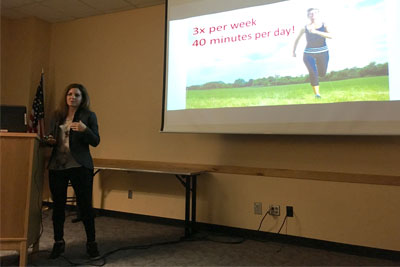Stress occurs when the demands in daily life exceed ones ability to handle it. Stress can occur in many different areas of life: home, environmental, work, and so forth. Although everyone experiences stress, not everyone reacts the same. When people are under stress their bodies can release certain hormones that could be harmful over time. While stress doesn’t directly cause disease, it can increase the risk of developing a wide range of illnesses, or make current diagnoses worse.
 For instance, researchers at UAB are interested in the link between stress and diabetes. There are three types of diabetes with type 2 being the most controllable, mainly because it is due to poor diet, obesity, and lack of exercise. Type 2 diabetes is a prominent health concern, especially in the southeastern region of the United States.
For instance, researchers at UAB are interested in the link between stress and diabetes. There are three types of diabetes with type 2 being the most controllable, mainly because it is due to poor diet, obesity, and lack of exercise. Type 2 diabetes is a prominent health concern, especially in the southeastern region of the United States.
So, what’s the link? First, stress can lead to increases in insulin-resistance, where the body fails to respond to insulin. Insulin resistance occurs long before the onset of full blown type 2 diabetes. While insulin injections and medications are available to treat diabetes, other factors could be at play. Specifically, chronic inflammation. Inflammation is the body’s natural response to injury, and chronic stress can cause the body to react similar to injury. The build-up of these chemicals in the bloodstream over time can result in long-lasting inflammation, which can increase risk for type 2 diabetes.
Kat Sweatt, of the UAB Nutrition Sciences Ph.D. program, studies the effects of stress and inflammation on the risk for type 2 diabetes in women, which she explained at the April 4, 2016 Discoveries in the Making event at Hoover Public Library. She has conducted several studies examining factors that can help address this connection. In one study examining the effects of exercise, she demonstrates that exercise can affect insulin resistance associated with increased stress, resulting in lower stress levels. In another study examining the effects of diet, she found that a non-calorie restricted low carbohydrate diet, consisting of mainly vegetables and protein, compared to a high carbohydrate diet (potatoes, rice, fruit, bread) decreased the risk of diabetes in just a few weeks. Individuals on a low carbohydrate diet were less insulin resistant and exhibited lower levels of stress.
While diabetes is a physical condition, stress can increase the risk of developing diabetes. However, research has demonstrated that a low carbohydrate diet and exercise can help in combating this illness. This research has demonstrated the beneficial effects of diet and exercise on type 2 diabetes; however, there are not many studies on the long term effects. Kat hopes to conduct similar studies over longer periods of time to examine the long term effects of diet and exercise on diabetes.